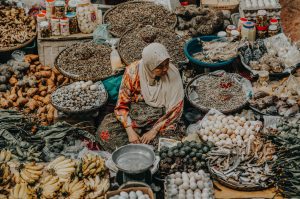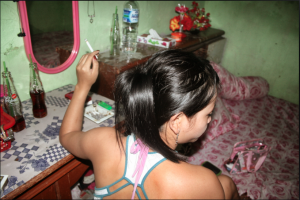 The question of the conditions of migrant workers in Malaysia is often raised, but the state in which they live as a part of the local workforce continues to be unresolved, if addressed at all. On April 15th 2017, a forum titled “Expression Away from Home” was held at Ilham Gallery as a joint initiative between Ilham Conversations, North-South Initiative, and Projek Dialog, in order to stir conversations regarding migrant workers and creative expression.
The forum featured Nasrikah Sarah from Indonesia and Dil Masrangi Magar from Nepal, and was moderated by Projek Dialog’s Victoria Cheng. The forum introduced Nasrikah and Dil’s experiences as migrants, where they discussed their lives both before and after moving to Malaysia, with a heavy focus on their aspirations and respective forms of artistic expression.
The common theme shared by both Nasrikah and Dil at the beginning of the forum was how they pushed aside their personal aspirations in order to support their family by moving to Malaysia to work. For Nasrikah, her studies in school and hopes of becoming a lecturer were halted when she moved to Malaysia at the age of seventeen to work as a domestic worker. At that time, she had just graduated from high school, with no experience of the work a domestic worker was expected to do.
She described the intense and uncomfortable experience of the move, and how the conditions not only prohibited her from achieving her own dreams, but also deprived her of a decent standard of living. “In one house, there would be more than 100 people,” Nasrikah explained, “but we wouldn’t do anything because we needed a job…we were afraid”. Most of her money was sent back to her family in Indonesia, but it was clear that the most taxing part about her move was her inability to pursue her aspirations. She described her hope for freedom and better jobs, and how she was met with the unfair treatment she encountered due to her race and language.
Similarly, Dil discussed his initial move in 2003 to the Malaysian workforce as difficult due to the poor treatment of migrant workers. For migrant workers, there is not a line of contact between themselves and employers, meaning they are not given an outlet to voice out their opinions and concerns regarding their welfare. The unfairness and unreasonable salaries have evidently been problematic for people like Dil, who explained how his first job here was in a sewing factory and he had no prior experience in the field. For his first month, he was given training, but not a salary. He received a salary the next month, but it was only RM72, which was barely enough to sustain himself, let alone send back to his family in Nepal.
Like Nasrikah, Dil also had his own aspirations before moving, but his was to be a singer. After the discussions on Dil and Nasrikah’s lives, the forum directed towards their use of art as their voice. Dil made it clear that there is a lack of migrant voices within the local scene, especially in regards with finding platforms to express themselves artistically. This significantly impacts how they are able to pursue their ambitions; long work hours combined with restricted access to such platforms deprives them of a chance to showcase their talents.
Nasrikah read her poem titled Jerit Pekerja Rumah Tangga, or “Screams of a Domestic Worker”, which she dedicated to all workers who are not given the rights they deserve. It entailed descriptions of what domestic workers go through, and how their well being and emotions are often overlooked. The xenophobia that such workers encounter has greatly set back their progress and even emotional states.
Dil provided a contrast by singing the “Nepali Song”, which had spiritual, nationalistic, as well as motivational messages within the lyrics. The deep connection that Dil described in his song was due to his cultural roots, as well as the hardships he pushes through in his working life.
Both Dil and Nasrikah work to empower other workers to express their art forms, but the lack of representation is a clear hurdle. However, they both expressed hope when the discussion dived into the question of art’s importance. Due to its subjective nature, it was in agreement between both panelists as well as Victoria that art is a method which can be used to counter the xenophobia previously mentioned, as well as spread ideas. It is through such methods that ambitions of migrant workers have an outlet to be fulfilled, and progressive steps to rid our society of discrimination and lack of workers’ welfare can be attained.
Conclusively, the forum was an eye-opener and gave insight about not only the mistreatment of migrant workers here in Malaysia, but also showcased two extremely talented workers who are advocating for their community’s voices to be heard. Even though there are a scarce number of outlets for them to express themselves, forums such as these provide an opportunity for a greater audience to hear what they have to say, and more importantly, spread the message. The conversation about the perspectives of two different workers with a common aspiration was one that sparked exchanges of experiences and opinions, but in the end contributed to greater focus on the issue surrounding migrants in Malaysia.
*Note: Nasrikah Sarah has actually written a blog post about her experience being a panelist on this forum. Please click this link to read about her experience in the Indonesian language: https://buruhmigran.or.id/2017/04/17/project-dialog-berikan-wadah-pekerja-migran-di-malaysia-untuk-berkesenian/]]>
The question of the conditions of migrant workers in Malaysia is often raised, but the state in which they live as a part of the local workforce continues to be unresolved, if addressed at all. On April 15th 2017, a forum titled “Expression Away from Home” was held at Ilham Gallery as a joint initiative between Ilham Conversations, North-South Initiative, and Projek Dialog, in order to stir conversations regarding migrant workers and creative expression.
The forum featured Nasrikah Sarah from Indonesia and Dil Masrangi Magar from Nepal, and was moderated by Projek Dialog’s Victoria Cheng. The forum introduced Nasrikah and Dil’s experiences as migrants, where they discussed their lives both before and after moving to Malaysia, with a heavy focus on their aspirations and respective forms of artistic expression.
The common theme shared by both Nasrikah and Dil at the beginning of the forum was how they pushed aside their personal aspirations in order to support their family by moving to Malaysia to work. For Nasrikah, her studies in school and hopes of becoming a lecturer were halted when she moved to Malaysia at the age of seventeen to work as a domestic worker. At that time, she had just graduated from high school, with no experience of the work a domestic worker was expected to do.
She described the intense and uncomfortable experience of the move, and how the conditions not only prohibited her from achieving her own dreams, but also deprived her of a decent standard of living. “In one house, there would be more than 100 people,” Nasrikah explained, “but we wouldn’t do anything because we needed a job…we were afraid”. Most of her money was sent back to her family in Indonesia, but it was clear that the most taxing part about her move was her inability to pursue her aspirations. She described her hope for freedom and better jobs, and how she was met with the unfair treatment she encountered due to her race and language.
Similarly, Dil discussed his initial move in 2003 to the Malaysian workforce as difficult due to the poor treatment of migrant workers. For migrant workers, there is not a line of contact between themselves and employers, meaning they are not given an outlet to voice out their opinions and concerns regarding their welfare. The unfairness and unreasonable salaries have evidently been problematic for people like Dil, who explained how his first job here was in a sewing factory and he had no prior experience in the field. For his first month, he was given training, but not a salary. He received a salary the next month, but it was only RM72, which was barely enough to sustain himself, let alone send back to his family in Nepal.
Like Nasrikah, Dil also had his own aspirations before moving, but his was to be a singer. After the discussions on Dil and Nasrikah’s lives, the forum directed towards their use of art as their voice. Dil made it clear that there is a lack of migrant voices within the local scene, especially in regards with finding platforms to express themselves artistically. This significantly impacts how they are able to pursue their ambitions; long work hours combined with restricted access to such platforms deprives them of a chance to showcase their talents.
Nasrikah read her poem titled Jerit Pekerja Rumah Tangga, or “Screams of a Domestic Worker”, which she dedicated to all workers who are not given the rights they deserve. It entailed descriptions of what domestic workers go through, and how their well being and emotions are often overlooked. The xenophobia that such workers encounter has greatly set back their progress and even emotional states.
Dil provided a contrast by singing the “Nepali Song”, which had spiritual, nationalistic, as well as motivational messages within the lyrics. The deep connection that Dil described in his song was due to his cultural roots, as well as the hardships he pushes through in his working life.
Both Dil and Nasrikah work to empower other workers to express their art forms, but the lack of representation is a clear hurdle. However, they both expressed hope when the discussion dived into the question of art’s importance. Due to its subjective nature, it was in agreement between both panelists as well as Victoria that art is a method which can be used to counter the xenophobia previously mentioned, as well as spread ideas. It is through such methods that ambitions of migrant workers have an outlet to be fulfilled, and progressive steps to rid our society of discrimination and lack of workers’ welfare can be attained.
Conclusively, the forum was an eye-opener and gave insight about not only the mistreatment of migrant workers here in Malaysia, but also showcased two extremely talented workers who are advocating for their community’s voices to be heard. Even though there are a scarce number of outlets for them to express themselves, forums such as these provide an opportunity for a greater audience to hear what they have to say, and more importantly, spread the message. The conversation about the perspectives of two different workers with a common aspiration was one that sparked exchanges of experiences and opinions, but in the end contributed to greater focus on the issue surrounding migrants in Malaysia.
*Note: Nasrikah Sarah has actually written a blog post about her experience being a panelist on this forum. Please click this link to read about her experience in the Indonesian language: https://buruhmigran.or.id/2017/04/17/project-dialog-berikan-wadah-pekerja-migran-di-malaysia-untuk-berkesenian/]]>
An Expression Away from Home
Share your thoughts!
More Articles


Babigate 2020
November 28, 2020
by Yvonne Tan We are no stranger to anxieties surrounding halal consumption practices and the danger of contamination making waves in the media with a
Latest Blogs
Projects
About Us



